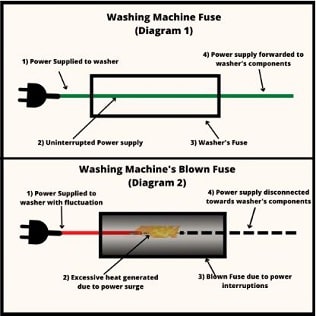A washing machine is a home appliance used for washing clothes regularly and it requires a power supply to function.
If your washer turns off automatically or if it is getting disconnected from the power supply, then this article is exactly for you.
After reading this article you should be able to do the basic diagnosis yourself.
Here’s what this article covers.
So without wasting time, let’s dive right into it.
Disclaimer
This article discusses and touches on points purely related to “Washing machine turning off” i.e. disconnecting from the power supply at any given point in time. If your washer is stopping in mid-cycle while its power is ON, you can refer to our in-depth guide here.
Why does a washer turn off automatically?
If your washing machine turns off or disconnects from the power automatically, then it indicates potential damage induced to one or more components that handle the power.
It may also be caused due to a faulty power plug or damaged power chord, a weak or blown fuse, loose connections within the electrical wires, a faulty lid switch, etc.
For a quick overview, have a look at the components that come into play when your washing machine is turned on.
Let’s take a quick look at the major causes along with possible solutions
1.) Power cut
- If the washer shuts off at any point during operation then the first step is to check if there is a power cut in your household supply.
- Power cuts may occur due to various factors such as scheduled maintenance in your locality, extreme weather conditions, major breakdowns, etc.
Solution: If there is a temporary power cut then simply unplug the washer and resume your laundry when the power supply is restored with stability because there is nothing you can do in this situation.
If you have a suitable power backup source available for your laundry then you may use them for time being to complete your task.
2.) Power Fluctuations OR Unstable Power Supply
Although the modern washers are capable of bearing power fluctuations to some extent but constant and intensive power surges and dips may affect the washer’s functionality and lead to disconnecting them from the power supply.
What components of the washer are affected during power fluctuations?
The components such as power chord cable, electrical wires, connections, fuse, control panels, sensors, motor, water pumps, or any other component that functions using electricity may get impacted.
Additionally, if any of these components are already faulty or damaged then power fluctuations can easily trigger them to malfunction.
Can power fluctuations shut off my washer?
Yes, power fluctuations cause the voltage to surge or dip very rapidly and if this exceeds the Washer’s threshold value then it will automatically disconnect from the power supply to prevent any further damage.
In some cases, extreme power fluctuations may blow up the internal components
Let’s take a quick look below at a few points to understand the impact of power fluctuation on your washer.
- A temporary power fluctuation such as dips and surges in the power supply may lead to halting your washer.
- Extreme fluctuations especially when the power supply dips can completely shut your washer off and disconnect from the power supply.
- Similarly, a constant surge in the power supply can generate excessive heat leading to damage to the washer’s electrical components responsible for the power supply and functions.
How do I protect my washer during power fluctuations?
In order to prevent the washer from being damaged caused due to constant power fluctuations, you can keep the below points in mind.
- Check if there is a temporary fluctuation observed in the power supply with the help of a multimeter and if you notice constant fluctuations then simply, turn off the washer and wait until the power supply is stable.
- Don’t use any electronic appliances during excess power fluctuations.
- If your household is affected by frequent power fluctuations then it is better to get it fixed at the earliest or use a suitable power stabilizer for your laundry.
Lastly, In case of a power fluctuation, it is recommended that you unplug your appliance from the socket and restart it when the power supply has stabilized.
3.) Loose connectivity
Loose Connectivity is another major reason for the Washer to turn off automatically.
The washers have a lot of electrical components and each of these components is responsible for certain Washer functions.
All these components are interconnected with each other using electrical connectors, wires, cables, etc. and any loose connection can cause the Washer to turn off.
Can a loose electrical connection power off my washer?
Electrical components and their internal or external electrical wirings need to be stiff and appropriate from all sides in order to ensure safe and smooth Washer functioning.
If any of these components or their electrical wirings are loose, it may cause an electrical short circuit OR completely halt the Washer.
A loose connection or an electrical short-circuit can cause the Washer to turn off automatically as a safety measure to prevent any further damage.
Similarly, a faulty or bad electrical connection can also lead to the Washer malfunctioning.
Due to excess vibrations or while moving the internal wirings may loosen further and result in a complete halt.
Solution: These types of errors need to be addressed by a service professional as they can diagnose using applicable devices and troubleshoot the cause accordingly.
4.) Faulty Control Panel Sensors
The Washer has an in-built control panel that uses sensors to receive and process electrical signals.
These sensors are also responsible for the various Washer operations and if any of these sensors turns faulty, it may lead to Washer turning off automatically.
Solution: Try to unplug the washer and perform a hard reset and restart the washer if it works.
5.) Faulty Power Plug or Cable
A faulty power cable can interfere with the power supply and may lead to shutting off the washer automatically.
A washer’s power cord may get damaged due to many reasons, here are some common reasons usually associated with a faulty power cable OR plug.
- The washer’s power cord may get damaged, if the cable gets stuck, twisted, or pressed under the washer or under an object that is placed close to the washer.
- A constant surge in the power supply may cause the wire to burn out.
- A Washer’s power plug may also get damaged if it is not inserted properly in the socket OR if there is any loose connection with the socket.
- Possible damage caused by rodents to the internal or external electrical cables and wires.
Solution: Inspect the power cable and cord thoroughly, and replace them if you notice any damage or wear out.
6.) Blown or Weak Fuse
This is another common reason why a Washer may turn off automatically.
Usually, there are one or two fuses installed in a washing machine and can be located below the control panel.
This fuse is responsible for ensuring a smooth and constant power supply to the Washer.
In general, a fuse is equipped to safeguard the washer’s electrical components during heavy power fluctuations, especially during power surges, and prevents excessive heating that is usually caused due to excessive power surges.
If the fuse is blown, it may cause an abrupt power cut-off and turn off the Washer.
A blown fuse usually happens due to a sudden power surge OR a faulty appliance that is connected to the same power circuit.
Having said that, a blown fuse in a washing machine is quite uncommon but this does not mean that you rule out the possibility of a blown switch.
What does the washing machine fuse look like?
The Washing Machine fuse looks like a tiny glass tube with metallic caps on both the ends, and it contains a thin metal thread that connects to these caps. Blown fuses appear darkish or have black marks due to excessive heat.
Constant power surges in the supply may result in a blown fuse.
Let’s take a quick look at the image below that contains 2 diagrams of a washing machine fuse.

Diagram 1
- It shows that the power supplied to your washer’s electrical components passes through a fuse fitted in the washer.
- In diagram 1, the supply is stable and allowed to proceed further.
Diagram 2)
- The power supply is unstable or fluctuating and there is an abrupt power surge.
- Excess power results in extreme heating, thereby resulting in a blown fuse. The blown fuse will turn dark and or break the cylindrical glass tube.
Solution: Inspect if the fuse is blown and simply replace the fuse with a new one if required.
How do you replace a fuse of the washing machine?
In order to replace a fuse, you need to locate them first.
Remember, a washer may have one or more fuses installed.
Here’s a step by step information on replacing the fuse.
- To find the fuse, first, unplug the machine from the power outlet.
- Then, open up the control panel and locate the fuse box.
- Inside, you’ll find a diagram that shows you which fuse corresponds to which part of the washer.
- Once you’ve found the correct fuse, replace it with a new one and plug the machine back in.
Note: Washing machine fuses are different from electrical fuses that are designed for circuit breakers.
7.) Other causes
Circuit breakers: A tripped circuit breaker could be another cause of power failure hence you may simply inspect and fix them accordingly.
Check the power outlet: Using a multimeter check if there is a power supply available or an alternative way to check the power is to plug in another appliance and see if it works.
Final Thoughts
If you have a problem with your washing machine’s power supply, it is important to troubleshoot the issue as soon as possible.
There are a few common reasons why a washing machine may turn off automatically.
These include loose connections, damaged by rodents, blown or weak fuse, and tripped circuit breakers.
In most cases, you can easily resolve the issue by yourself.
However, if you are unable to do so, it is always best to consult a professional.
I hope this article helped you understand the reasons why your washing machine turns off automatically.
Frequently Asked Questions
Here are some common questions related to washing machine fuses that you may find helpful.
Can I complete the wash cycle during power fluctuations?
It is not recommended to use your electronic appliances during heavy power fluctuations. Simply turn them off and use them when the power is stabilized. Forcing a washer to perform in such conditions may lead to damage to the washer’s internal electrical components.
What are some other signs of a damaged or blown fuse?
When a washing machine fuse is damaged, you may notice one or more of the following symptoms.
1.) The washing machine doesn’t start.
2.) The washing machine starts but doesn’t fill with water.
3.) Water starts filling in the washer but suddenly stops.
4.) The washing machine doesn’t agitate or spin.
If you notice any of these, it is best to check the fuse and replace it if needed.
You May Also Like
- Why Does The LG Washer Leak From The Door? (Solved)
- Why Front load washing machine is not filling with water?
- Why is the LG washer making a loud grinding noise?
- Why does the washing machine sound like a helicopter?
- Why does the washer drain smell like sewage?
- Why does the sink gurgle when the washing machine drains?
- Why is the Whirlpool washer not agitating? (With Troubleshooting)
- Why Does the Washing Machine Beep?





